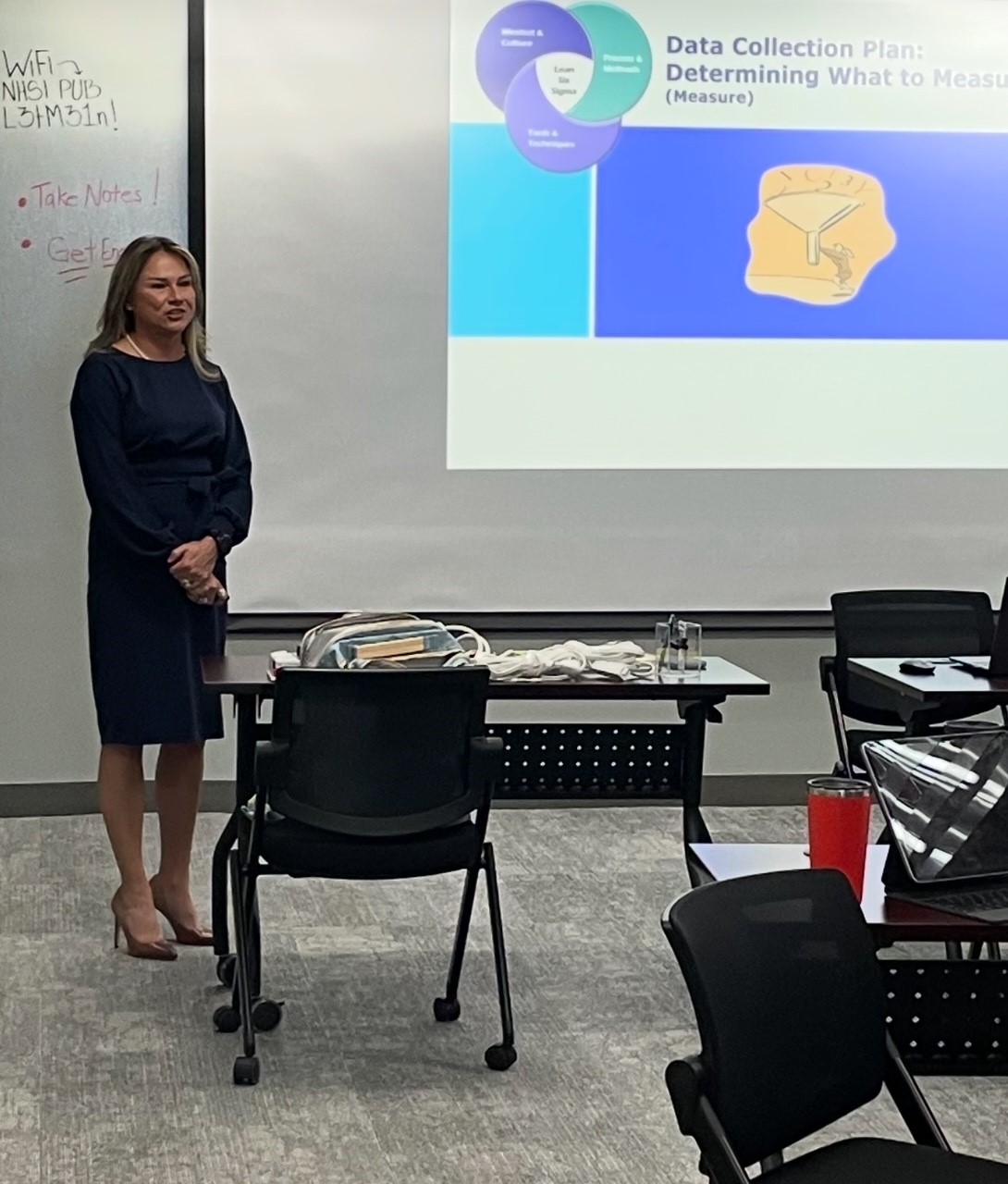Customer Spotlight: Jennifer Hopkins, Vizient
This month’s newsletter is one in a series about individuals working in continuous improvement. Each LSS practitioner gets to tell their CI story and share lessons learned. This month I spoke with Jennifer Hopkins, a LSS Black Belt with Vizient, a company that works with healthcare providers to improve clinical operations and quality of care. Jennifer completed her BB training with TMAC in 2004. She has worked in a variety of healthcare roles including laboratory, ambulatory, acute care support services, and directly in clinical settings. She has also worked on the insurance side of healthcare.
When did you begin working in healthcare, and what was your role? What other areas did you work in before switching to
Continuous Improvement?
My healthcare journey started in 1997 as a year of internship to complete a Bachelor of Science degree in clinical laboratory science. My career for the next eight years was focused as a medical technologist.
How and when did you first get involved in CI?
Everything changed in 2004 when a promotion to laboratory process analyst opened the doors to Lean Six Sigma. The company chose TMAC to provide Black Belt training. Our goals were to improve efficiencies and increase quality.
What was your initial reaction when you first learned about Lean Six Sigma?
It was a match made in heaven! The laboratory is grounded in standard operating procedures, run charts, and process discipline. LSS demonstrated how doing the right thing at the right time in the right way for the right reasons could be possible for all types of processes and industries.

Tell me about your LSS training. What did you like? Dislike?
What is there to dislike? Haha! Loved the DMAIC structure, learning how the data is trying to tell a story through patterns, the importance of communication and teamwork, the crucial value of process maps. Disliked setting up hypothesis testing. Ugh.
Can you share a little about your experience as a Black Belt leading project teams?
The process of teams – forming, storming, norming, performing, adjourning – happens every single time. Tell the teams upfront it will happen and guide them through it. The power and resolution of PI [Process Improvement] are embedded in the team.
What did you like best about working as a BB?
Everyone has their own paradigm through which they see the world. When people begin to let those paradigms shift a little, everything begins to change. They walk in other’s shoes, and they see through a different lens. When that happens – miracles happen.
And what was most challenging? Biggest lessons learned?
Sometimes leadership says they are ready, but they really aren’t. It’s difficult in the beginning to read those tea leaves. Take things slowly. Communicate, communicate, communicate. Everyone accepts change at different tempos.
Tell me about your career path since your first assignment as a BB.
After being certified, I was hired as a laboratory manager. Then when the hospital system’s leadership discovered my LSS BB training, everything changed. The hospital system wanted projects and LSS training – an entire PI program. They required every leader – manager and up – to go through Yellow Belt training. Since then, I’ve worked not only in the acute care setting but also in the ambulatory environment and on the payer and consulting sides.
You previously mentioned teaching a lot of Yellow Belt workshops. Can you talk about how that came about, the number you have taught, and your experience leading those workshops?
Absolutely! After seeing what other Yellow Belt workshops were offering, I was a bit surprised. They were lacking content and only covered the basics of what were Lean and Six Sigma– which is what I would define as White Belt training. So I decided to create my own Yellow Belt workshop. I went through the entire BB course and pulled out the most important modules that would provide participants with the ability to facilitate a basic project. After teaching hundreds of people over the past 20 years, my passion for LSS has only increased. One student said, “that was the best explanation of standard deviation I’ve ever heard.” Another student said, “this has been the best class I’ve ever had.” Each class has taught me something new. But one thing remains the same – everyone loves a Skittles Pareto chart!
Looking back, how has LSS affected your career?
Oh gosh, Lean Six Sigma Black Belt Training changed my entire life – not just my career. I kid you not when I say that one of my kids has asked when I’m going to train him in LSS. Not a day goes by that I don’t use something learned during LSS BB training.
How would you advise someone just getting started who is considering a career in continuous improvement, especially in healthcare?
- Always remember that people are hesitant to change. Be patient and guide them through the process. Stay positive. Change is hard, and people need a cheerleader, a listening ear, and someone with whom to brainstorm.
- Triple check the data. The importance of operational definitions is pivotal!
- There is always a better way and another way to do something. You don’t have all the answers. But rest assured – the team does. Every single time.

If you are ready to start your own Lean Six Sigma journey, we have an Accelerated Black Belt class starting this fall! Find out more and register for our Accelerated Black Belt class. You can learn more about all of our classes here. Hope to see you there!


